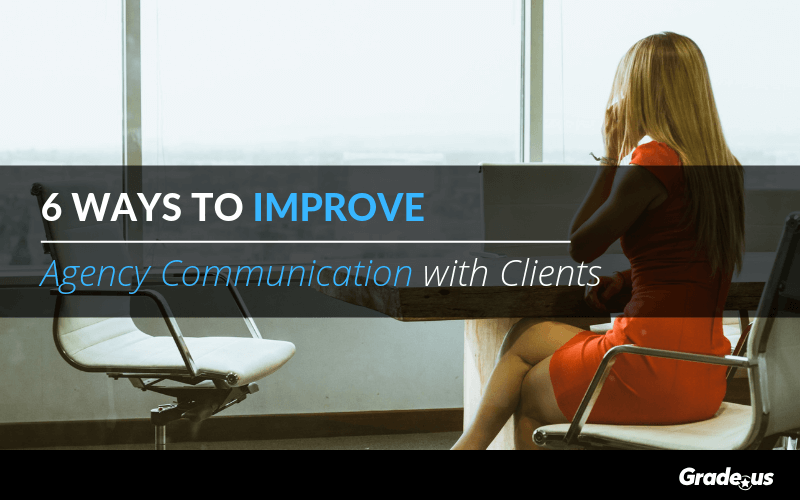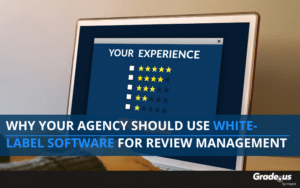All of us consultants and agency owners are in the communications business...even those of us who focus primarily on technical SEO. Yet often, the most important communications—the ones between us and our clients—break down. We're so busy trying to help clients communicate with their customers that we forget to talk to them.
And when those lines of communication break down, clients start shopping around. So, keeping those channels clear and strong is (or should be) a priority. If you can improve the way you communicate with your clients you can build relationships with them. And relationships are the only thing that help you keep those retention rates high.
Here are 6 ways to do just that.
#1 Get Serious About On-boarding
On-boarding is a lot more than sending a client an email to confirm they want you to move forward with the work (and yeah, I'm totally guilty of this).
Consultants, you're not exempt from this. Those who have developed an actual process tend to have happier clients, and they tend to be happier with their own work.
Why? Because when you onboard, you set the expectations. You remain in the driver's seat.
Like most of us, Greg Heilers of Jolly Content started out letting clients dictate terms. Even when those terms were unreasonable. "This left us unsatisfied. Sometimes it left our clients unsatisfied, too."
Now, Heilers starts every project with a contract which outlines each side's responsibility. Jolly Content also uses an extensive on-boarding survey. "We use it to get to know clients better, and to reduce the risk of accidentally misrepresenting them."
Which is a good second reason why on-boarding matters: you may think you know the client's business, but you might miss something vital. You can save yourself a lot of time and headache if you get your client to think about certain issues before you begin, and get them to tell you about them.
#2 Get Personal
It is so, so easy to get stuck in a trap of endless electronic communications. Shooting off a quick email is 100 times easier than having a conversation, especially when you're pressed for time.
But you should never miss an opportunity to meet a client in person, according to Robert Barrows of R.M. Barrows, Inc. "If you don't schmooze, you lose. I once had a client who was about an hour away by car, and we started sending her copy and layouts by fax. After awhile, someone who lived a lot closer to her picked up some of her business because they could see her in person more often."
Does this mean you're stuck working only with clients who live close by, or doomed to lose them if you can't? Of course not.
There are multiple ways you can get a little face time, even if your client lives halfway around the country. Attend the conferences your clients are attending (it will help you understand their industry better anyway). Keep track of where they live and invite them for coffee any time you happen to be in that city.
And if you literally can't afford to get out? Schedule a weekly or monthly video chat, and actually get on the video. If you can't do that at least try to jump on the phone every, now and then.
And look, introverts, I get it. Peopling is hard. If you're like me, making small talk is a struggle. I suck at it. I have to concentrate to make any happen at all.
If you're even more like me, you hate the sight of your own face staring back at you when you video chat.
But even introverts need and want relationships. Anything you can do to become more human to your clients is a good thing. Emails can turn you into a commodity. Personal communication makes you a person. When I take a survey of clients I've been with for years, I can say a good 80% of them are people who I've at least shared a phone call with.
#3 Weekly Check-ins
Here's a trap I get caught in: if I'm not confirming that I've received a request, asking a question, or turning in some content, I don't think to fire off emails to my clients.
But Kristine Cameron, of Content Cucumber does. So does everyone else at her agency: every Monday they email their entire client list. "We check in with them, suggest ideas for possible blog posts, or simply mention they're welcome to contact us with any concerns or questions."
These emails are all personalized, and Cameron says they have helped her writers and her clients establish deeper connections.
It's also a great choice because it keeps you positioned as an active, engaged partner, instead of turning you into a mere provider. You can do this no matter what kind of services you provide. It doesn't have to be a brainstorm.
It can be a quick, simple update. You can do it on Friday if Monday doesn't work with you, simply mentioning what you've done for the client that week.
#4 Find a Helpful Tool
If you can think of it, there's probably a MarTech tool that covers it. Certain content management systems are excellent for helping you both expedite the flow of information between you and your clients, and monitor it.
Chris Stasiuk, Founder & Creative Director of the Signature Video Group, has found one that works for him. "We use Wistia, a video content management system that lets us know exactly when and how a client has either reviewed a proposal or an ongoing project. This is invaluable because it tells us when to follow up with prospects. And with existing clients, we can see the parts of the video they've paused on, rewound to, or watched multiple times. This usually gives us advanced insight into what kind of revisions they will ask for."
You might not want that much oversight. But it's worth sitting down to think about what an ideal client communication tool would look like for your business, and it's worth shopping around to find one that's at least close to what you envision. Having a platform also makes you look more professional, especially given many of us work out of bedrooms, living rooms, and coffee shops.
Don't want to go crazy finding an expensive platform? Slack is magical.
#5 Report the problems
Who wants to admit things are going wrong?
But it can be massively helpful to do just that.
Mohammed Ali, Founder of Boomerang Social says he likes to treat clients like team members. "I let them know what strategy they're taking and why I believe it will provide the best results."
He also tells them when campaigns aren't going as well as he'd hoped. "I come up with an alternative strategy, and let the client know the campaign wasn't going as planned. I tell the client why I think this is happening and what we're going to do to solve the issue."
It's always better to be the one who picks up the phone to discuss a problem. You don't want to receive that phone call. And when you're the one who makes it, you don't just look more professional and trustworthy. You get the chance to solicit some ideas from the client, too.
After all, who knows your client's audience better? And isn't that who you're trying to appeal to?
#6 Report the wins!
There are few quick wins in marketing. As a result, clients often get antsy. They wonder what they're paying for and they start looking around for someone who can make the magic happen faster.
Nobody realistically can, but they look.
So reporting every win or sign of progress is a plus, even if it's not a win that puts you 100% to goal.
Stacy Caprio, Founder of Accelerated Growth Marketing says this has made a significant difference in her relationships with her clients. "Often, these moments are overlooked, and not communicated to the client. But I've found our relationships get much better when clients are fully aware of all the wins."
To do this, you might have to adjust your own definition of a "win." Getting one earned backlink might not feel like a win to you because you're aware of all the other backlinks you'll need to earn to really boost your client's business. But an email that says: "Hey, great news! Your business got featured on the Grade.us blog recently," (or whatever site), will often excite the client.
Remember, they're not saturated in all this stuff day-in and day-out the way we are.
Kornel Kurtz, Founder & CEO of WebTek, also notes, "We've found that clients are more willing and proactive about sharing their 'wins' with us when we share ours with them!"
Anyone who has ever torn their hair out trying to chase clients down for real (not stock) photographs or stories of what they're doing knows how big a deal that is. Kurtz also notes this has built a more solid friendship between himself and his clients.
You Do You, But Make An Effort
Obviously all these methods and ideas won't work for all agencies, or all consultants. We all have different service offerings, approaches, ideas, schedules, and clients.
But you can see significant improvement just by implementing one or two of these ideas. And if none of them seem to suit, at the very least giving some thought to ways you can communicate more freely and frequently with your clients will pay off in spades.
About the Author
Raney C. Hudson
Raney C. Hudson is an independent content consultant with a 10+ year track record in the digital marketing industry.









